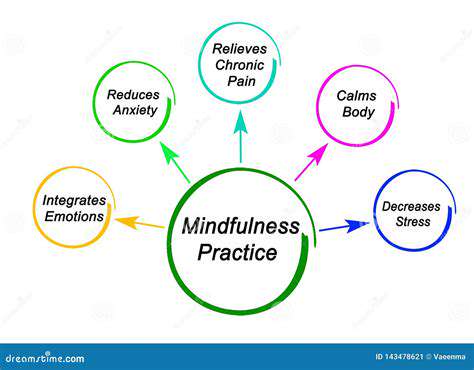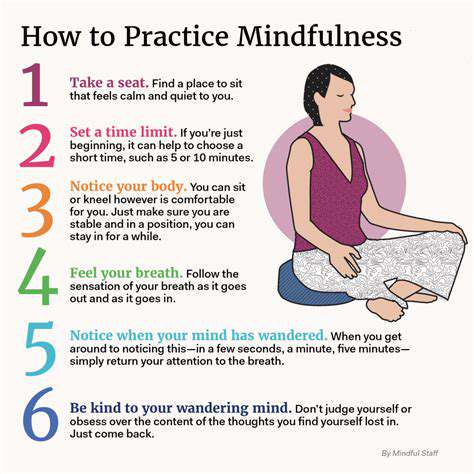The Transformative Benefits of Practicing Mindfulness Daily
What is Mindfulness?
Understanding the Concept of Mindfulness
Mindfulness is the practice of maintaining a heightened awareness of our thoughts, feelings, bodily sensations, and the surrounding environment. It involves observing these elements without judgment, allowing us to experience the present moment fully. This awareness can transform our approach to everyday experiences, helping us to respond to situations with clarity and calmness rather than reacting impulsively.
At its core, mindfulness encourages us to step back from the chaotic flow of life. By focusing on the here and now, we can enhance our mental and emotional well-being, leading to improved stress management and better overall health. It is a fundamental technique rooted in various spiritual traditions but has gained widespread popularity due to its accessibility and effectiveness in modern life.
The Benefits of Daily Mindful Practices
Incorporating mindfulness into our daily routine can significantly impact our overall quality of life. Research indicates that regular mindfulness practice can lead to reductions in anxiety, depression, and stress levels. Furthermore, it can improve attention span, emotional resilience, and even relationships. When we practice mindfulness, we become better equipped to navigate life's challenges with a clearer perspective.
Daily mindfulness practices, such as meditation, yoga, or simply taking a few mindful breaths, can rewire our brains to respond more positively to stress. By dedicating a few moments each day to mindfulness, we not only cultivate a sense of inner peace but also create a strong foundation for improved mental clarity and emotional stability.
The Benefits of Mindfulness Practice

The Impact on Mental Health
Practicing mindfulness daily can significantly reduce symptoms of anxiety and depression. By focusing on the present moment, individuals often find a sense of peace that can alleviate racing thoughts.
Research has shown that regular mindfulness practice leads to improved emotional regulation. This increased control over emotions can promote a more positive mindset and enhance overall well-being.
Enhancing Focus and Concentration
Mindfulness encourages individuals to pay attention to their thoughts and surroundings, which can enhance focus and concentration. This heightened awareness allows for better task initiation and completion.
Those who practice mindfulness regularly report higher levels of productivity and creativity. By minimizing distractions, individuals can unlock their full potential in both personal and professional settings.
Improving Relationships
Mindfulness also has profound effects on interpersonal relationships. Practicing mindfulness helps in fostering empathy and understanding, making interactions more meaningful.
Through improved communication skills and active listening, individuals can cultivate deeper connections. This can lead to more harmonious and fulfilling relationships.
Boosting Physical Health
In addition to mental advantages, mindfulness can have remarkable benefits for physical health. Studies indicate that mindfulness practices can lower blood pressure and improve heart health.
Furthermore, by reducing stress levels, practitioners may experience a stronger immune response, leading to fewer illnesses. This holistic approach can greatly enhance one's quality of life.
Encouraging Personal Growth
Daily mindfulness practices promote self-awareness and personal growth. By taking the time to reflect, individuals can identify patterns in their behavior and thought processes.
Such awareness paves the way for meaningful changes and better decision-making. Ultimately, this journey fosters a deeper understanding of oneself and enhances self-esteem.
How to Incorporate Mindfulness into Your Daily Life

Understanding Mindfulness
Mindfulness is the practice of being fully present and engaged with the current moment. It involves paying attention to our thoughts, feelings, and surroundings without judgment. This awareness can significantly enhance our emotional resilience and overall well-being. The roots of mindfulness are often traced back to ancient meditation practices, particularly in Buddhism.
In modern contexts, mindfulness has been adapted into various therapeutic techniques, making it accessible to a broader audience. Research indicates that practicing mindfulness can lead to decreased levels of stress, anxiety, and depression. It encourages a focus on the present, allowing individuals to break free from the worries of the past or future.
Mindfulness is more than just meditation; it can be embedded in daily activities such as eating, walking, or even doing chores. By integrating mindfulness into our routines, we cultivate a greater appreciation for life's simple pleasures. This not only enriches our experiences but also helps us manage distractions and improve focus.
Ultimately, understanding mindfulness serves as the foundation for effectively incorporating it into our daily lives. As we recognize its benefits, we can pave the way for a more mindful lifestyle.
Simple Techniques for Daily Mindfulness
One of the easiest ways to practice mindfulness daily is through meditation. Setting aside just a few minutes each day to sit quietly and focus on your breath can make a significant difference. You don't need extensive training; simple breathing exercises can help ground you in the present moment.
Another straightforward technique is mindful eating. This involves slowing down during meals, savoring each bite, and noticing the flavors and textures of your food. This practice not only enhances your dining experience but also promotes better digestion and helps with portion control.
Mindful walking is also a beneficial practice to incorporate into your routine. Pay attention to the rhythm of your footsteps, the sensations in your body, and the sounds around you as you walk. This practice connects physical movement with mindfulness and can be done anywhere, whether in a park or on your way to work.
Lastly, consider incorporating mindfulness into your daily tasks, such as washing dishes or cleaning. Focus entirely on the activity, noting the sensations and movements involved. Over time, these small practices contribute to a heightened sense of awareness and clarity in your life.
Creating a Mindfulness Routine
Establishing a mindfulness routine can help make the practice a consistent part of your daily life. Start by choosing a specific time each day to focus on mindfulness, whether in the morning, during lunch, or before bed. This consistency will help reinforce the habit and make it easier to integrate.
Including mindfulness moments throughout your day, such as taking a few deep breaths before a meeting or spending a minute observing nature, can also enhance your routine. It’s essential to start small, gradually increasing the duration and frequency of your practice as you become more comfortable.
Using mindfulness apps can be a fantastic way to support your practice. Many apps offer guided meditations, reminders, and tracking features to help you stay motivated. These tools can provide structure and variety, making it easier to explore different mindfulness techniques.
Ultimately, remember that everyone's mindfulness journey is unique. Be patient with yourself and remain open to adapting your routine as you discover what works best for you.
The Long-Term Impact of Mindfulness
Practicing mindfulness consistently can lead to profound changes in your mental and emotional well-being. Studies show that regular practitioners report less stress and anxiety, which can have positive effects on both physical health and relationships. Mindfulness creates a deeper understanding of one’s thoughts and emotions, enabling better management of reactions and expectations.
Long-term mindfulness practice has also been linked to improved focus and cognitive flexibility. This boost in mental clarity can lead to enhanced productivity, better decision-making, and a heightened ability to problem-solve. The skills developed through mindfulness can spill over into various aspects of life, from personal to professional settings.
Furthermore, the emphasis on self-compassion in mindfulness can lead to healthier self-talk and improved self-esteem. As we learn to treat ourselves with kindness, we become more resilient in facing challenges and setbacks. This shift in perspective is crucial for fostering a positive mindset.
In essence, the long-term impact of mindfulness can lead to a healthier, more balanced life. By committing to this practice daily, we open the door to sustained personal growth and fulfillment.